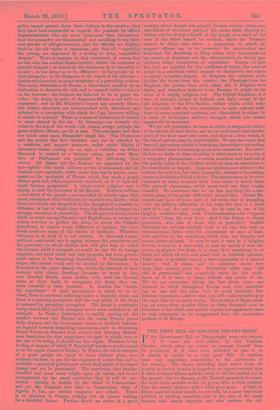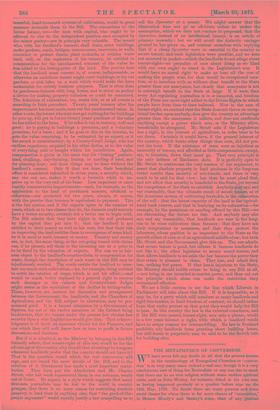THE FIRST BILL ON ENGLISH TENANT-RIGHT.
I F the Government Bill on Tenant-right were only serious.
if it were not over - ridden by the Contract Clauses, which allow an owner to exempt himself from its provisions, if it were even intended to pass it as it stands, it would be a very good Bill. It contains some very important concessions to the cultivators of the country. The clause extending legal notice from six months to twelve months is imperfect, as experts contend that it takes a farmer fifteen months fairly to lift his capital out of the ground ; but we daresay, as Mr. Disraeli promised two years, the extra three months would be given, after a little pressure from the county electors, with a fairly good grace. A right to fifteen months' notice would, we are told, be a most important addition to existing securities, and in the case of the small farmers, who cannot improve, and who continue the old, wasteful, hand-to-mouth systems of cultivation, would in great measure reconcile them to the Bill. The concessions to the better farmer, too—the man with capital, who ought to be allowed to rise to the independent position once occupied by the minor gentry—are in principle very valuable. The tenant who, with his landlord's consent, shall drain, erect buildings, make gardens, roads, bridges, watercourses, reservoirs, or wells, construct or protect fences, plant orchards, or reclaim waste land, will, on the expiration of his tenancy, be entitled to compensation for the unexhausted remnant of the value he has added to the letting-price of the land. The proviso here that the landlord must consent is, of course, indispensable, as otherwise an ambitious tenant might erect buildings, or lay out gardens, or sink lakes on a scale which would make the farm undesirable for strictly business purposes. That is often done by gentlemen-farmers with long leases, and is about as perfect -a device for making property valueless as could be conceived. The definition of exhaustion, too, seems fair, or at all events is - according to Irish precedent. Twenty years' tenancy after the improvement has been made, runs out the unexhausted value. In other words, the tenant who may now get nothing for the buildings he puts up, will get in future twenty years' purchase of the value he has added to the farm. If he takes it out in tenancy, well and good ; he is paying in buildings a premium, and a voluntary premium, for a lease ; and if he goes or dies in the interim, he _gets the value remaining, to be estimated by an expert, or if his award is unsatisfactory, by a County-Court Judge, who has 'endless experience, acquired in his other duties as to the value of everything sold or bought within his jurisdiction. Again, compensation is given in the same way for "boning" pasture- land, chalking, clay-burning, liming, or marling of land, and for planting hops ; and these things may be done without the landlord's consent. Only if they are done, their beneficial effect is considered exhausted in seven years, a security which, any one can see, makes it worth a farmer's while to im- prove up to the very end of his iease. Less important or more rapidly remunerative improvements—such, for example, as the application to the land of purchased manure, artificial or otherwise--are protected for two years, always, of course, with the proviso that tenancy is equivalent to payment. This is the fair system, and if the experts agree to the number of years, which as to two classes they do, the farmers could scarcely have a better security, certainly not a better one to begin with. The Bill admits that they have rights in the soil produced by the capital they put into it ; that the landlord is not 'entitled to their money as well as his rent, but that their risk in improving the land entitles them to recompense of some kind, be it in meal or malt, tenancy or money. Tenancy and money are, in fact, the same thing, as the out-going tenant with claims can, if he pleases, sell them to the incoming one at a price to to be fixed by the valuation of experts. Nor can we in fair- ness object to the landlord's counter-claim to compensation for waste, though the description of such waste in this Bill may be injudiciously worded. The words enable the landlord to inter- fere too much with cultivation,—he, for example, being entitled to settle the rotation of crops which is not his affair,—and would be much better replaced by a general right to recover such damages as the valuers and County-Court Judges might assess as the equivalent of the decline in letting-value. Those, however, are matters for discussion and arrangement between the Government, the landlords, and the Chambers of Agriculture, and the Bill, subject to alteration, may be pro- nounced good. It is a formal admission by a Government of Squires, ten out of the twelve members of the Cabinet being landowners, that the tenant under the present law obtains less security than a wise Legislature would give him. That acknow- ledgment is of itself an immense victory for the Farmers, and one which they will well know how to turn to profit in future discussions and elections. .
But if it is admitted, as the Ministry by bringuig in this Bill formally admit, that tenant-right of this sort would be for the advantage of the country, why should that advantage be foregone whenever landlords prefer that the country should not have it? That is the question round which the real controversy will rage, and not round the mere details of the Bill, and to the solution of it Govenment has made a most important contri- bution. They have put the Absolutists and Mr. Charles Strutt, who last week represented them in our columns, nearly out of Court. He argues, in a style which suggests that many fist-rate journalists may be lost to the world in country granges, that there is no more reason for restricting absolute property in land than in anything else, that "the good-of-the- people argument" would equally justify a law compelling us to sell the Spectator at a penny. We might answer that the illustration does not go on all-fours, unless he makes the
assumption, which we dare not_venture to propound, that the Spectator, instead of an intellectual luxury, is an article of primary necessity ; but we will avoid the dialectic vantage- ground he has given- us, and content ourselves with replying that if a cheap Spectator were as essential to the country as secure tenure, and such legislation were possible, and we were not amerced in pocket—which the landlords do not allege about tenant-right—no prejudice of ours about doing as we liked with our own ought to stand in the Legislature's way. It would have no moral right to make us bear all the cost of making the people wise, for that would be exceptional taxa- tion, or to interfere with us without clear benefit to the State greater than our annoyance, but clearly that annoyance is not to outweigh benefit to the State at large. If it were, then every Act regulating journalism is in se immoral, and freedom of the Press one more right added to the Divine Rights in which people have from time to time believed. Now in the case of tenant-right, we contend that the State does not throw an excep- tional burden upon anybody, does give the country an advantage greater than the annoyance it inflicts, and does not confiscate anything except a power which may, as the Ministry allow, beneficially be abrogated. Mr. Strutt asks if the Legislature has a right, in the interest of agriculture, to order trees to be cut down. Certainly it would have if the general interest of the country, which wants other things than corn, did not pro- tect the trees. If the existence of trees were as injurious as insecurity of tenure, and afforded as little compensation, except, say, to foresters, down they must go. That very principle is the only defence of Enclosure Acts. It is perfectly open to Mr. Strutt to contravene the very essence of our argument, to assert that absolute property in land produces in the long-run better results than security of sub-tenure, and there is very much to be said for that view ; but then he must plead that, and not allow that security is beneficial to the State, yet beyond the competence of the State to establish. Anybody may say, and say reasonably, that the ultimate result of secure tenure, as of the American system of cultivating freeholds is the exhaustion soil; of the so ; that the latent capacity of the land is the agricul- tural bank reserve, and that in hurrying on its exhaustion—for example, by the premiums on marling offered by this Bill—we are discounting the future too fast. And anybody may also say, and say reasonably, that landlords are sure in the Tong- ran to be wiser cultivators than farmers • that they have not their temptations to meanness, and that they protect the labourers, whose position is as important to the State as the growth either of corn or of an agricultural middle-class; but both Mr. Strutt and the Government give this up. The one admits that secure tenure is good, but refuses it because landlords do not like it ; the other legislates to secure sound tenure, and then allows landlords to set aside the law because the power they thus retain is pleasant to them. They lose, and admit they lose, nothing but power. If that loss is injurious to the State, the Ministry should boldly refuse to bring in any Bill at all, —not bring in one intended to restrict power, and then cut out the principle which alone can make the restriction they recommend effective.
We are a little curious to see the line which Liberals in Parliament will take about this Bill. If it is impossible, as it may be, for a party which still numbers so many landlords and rigid free-traders, to limit freedom, of contract, we should rather hope that under protest on that point they would help the Bill to pass. In this country the law is the external conscience, and if the Bill were passed, tenant-right, now only a phrase, would in a few years become a right, with which a landlord would have to assign reasons for intermeddling. No law in Scotland prohibits city landlords from granting short building leases, but still leases in perpetuity may be said to be the Scotch rule for building sites.



































 Previous page
Previous page